Southern River Kinship
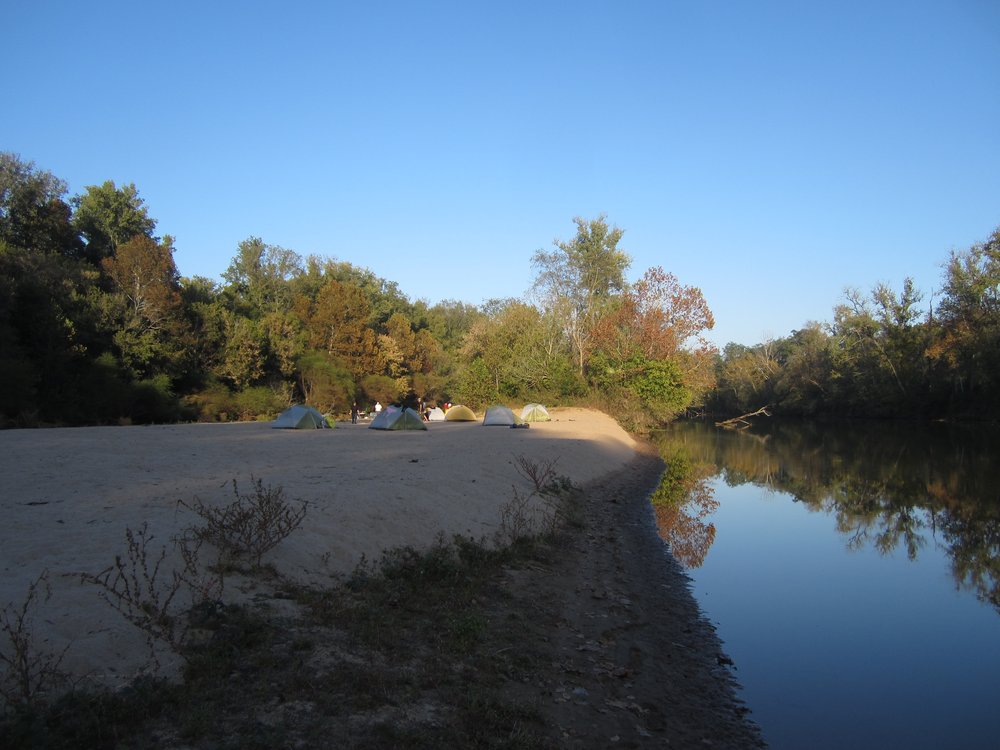
I unzipped my tent and slipped out into the cool of the South Carolina October morning. The sun, if it was trying to shine through, had a challenge in the gray cloud cover. I walked toward the still river hoping to see some sandpipers working the sandy shoreline. Perhaps in the night, while the Barred and Great Horned Owls hooted, some small bird had flown in. But the sandy shoreline wasn’t there anymore. Had I mis-remembered the soft bank of this island?
I walked past a half dozen stilled tents to the kitchen area, where I hoped to find some coffee. Bob, who runs river trips and had orchestrated the details of this float, had the pot set up. All I had to do was turn the knob and light the propane burner. This was cushy camping.
I looked over at the four sit on top kayaks, two regular kayaks, the wooden hand made canoe, and the supply raft. Something was missing.
“Where’s the second raft?” I heard Bob’s voice to my left.
Indeed, it had floated off in the night.

I unzipped my tent and slipped out into the cool of the South Carolina October morning. The sun, if it was trying to shine through, had a challenge in the gray cloud cover. I walked toward the still river hoping to see some sandpipers working the sandy shoreline. Perhaps in the night, while the Barred and Great Horned Owls hooted, some small bird had flown in. But the sandy shoreline wasn’t there anymore. Had I mis-remembered the soft bank of this island?
I walked past a half dozen stilled tents to the kitchen area, where I hoped to find some coffee. Bob, who runs river trips and had orchestrated the details of this float, had the pot set up. All I had to do was turn the knob and light the propane burner. This was cushy camping.
I looked over at the four sit on top kayaks, two regular kayaks, the wooden hand made canoe, and the supply raft. Something was missing.
“Where’s the second raft?” I heard Bob’s voice to my left.
Indeed, it had floated off in the night.
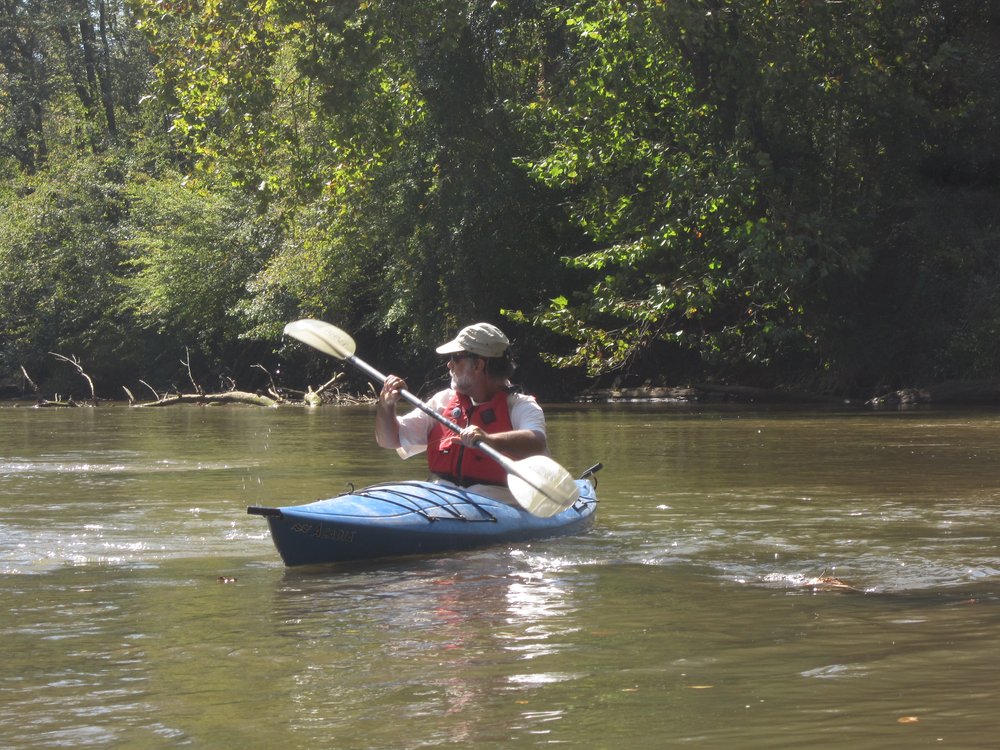
We were now off to experience John’s rivers, first the Pacolet and then the Broad. With us were three Wofford students; Haley, who assists the Environmental studies program; and Kaye Savage and Terry Ferguson, who both teach in the Environmental Studies program. Yes, there were twelve of us on this trip.

On Saturday morning we had gathered in Spartanburg to assemble the most amazing amount of gear. There were enough dry bags to equip an army. But also—we had a stove, a camp table, an enormous cooler, a poop tent, and tents, pads and sleeping bags enough for everyone. We drove south and east through beautiful pine forests to launch on the Pacolet River. I had read about the Pacolet in John’s book, My Paddle to the Sea. In it, he sets his canoe into the Pacolet in his back yard and heads toward the sea. Reading about this journey (I wrote about his and Mike's books earlier) I had been jealous—that he had a river in his back yard and that he could wind through rivers with such lovely names as the Broad and Santee, the Congaree. Though I love my Hudson River, it and its name do not hold the mysteries of a winding river shaded by sweet gum on a red-sand riverbank. Being on the Pacolet my envy returned. It’s an intimate river, narrow and snag-filled, with sycamore trees hugging tight to the water. It was all green and easy paddling, the current in the shallow water scooting us along. Carolina Wrens echoed their song from the river-side bushes, and Mockingbirds, the sound of the south, kept us company with their musical play. I would mosey along, having a conversation with Mike about crows or books that he loves, then loll in the water looking at a Phoebe until Kay and Allison stroked by in the wooden canoe, or the raft with the Wofford students coasted up, their talk and laughter adding to the tonic of the river.
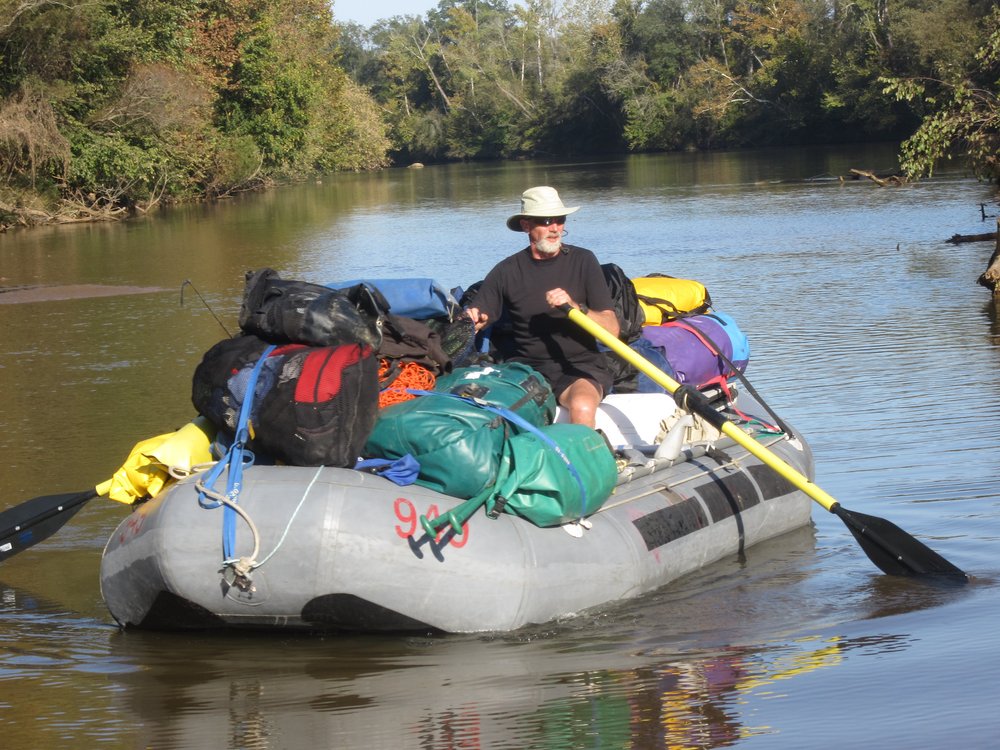
If there is one way to get to think like a river it is to spend time on a river. There, I experienced time differently, the years this river has flowed, and the no-time that it took us to arrive at the Broad River. There, the world opened up, the river less lively then the Pacolet, but more assured. The Wofford students spread onto the rounded sides of the gray raft, legs draped over the sides, and napped as their boat made its way downstream (until, of course, one of them fell out of the boat!). Soon we had pulled up on Goat island. In my reach of the Hudson we also have a Goat Island, with its rocky shoreline and tall trees. This island had a tuft of small trees, but consisted mainly of a wide sandy beach, perfect for our many tents. I pulled my kayak partially out of the water, thinking that this Broad River was not tidal like my Hudson. Nothing would sweep it off in the night.
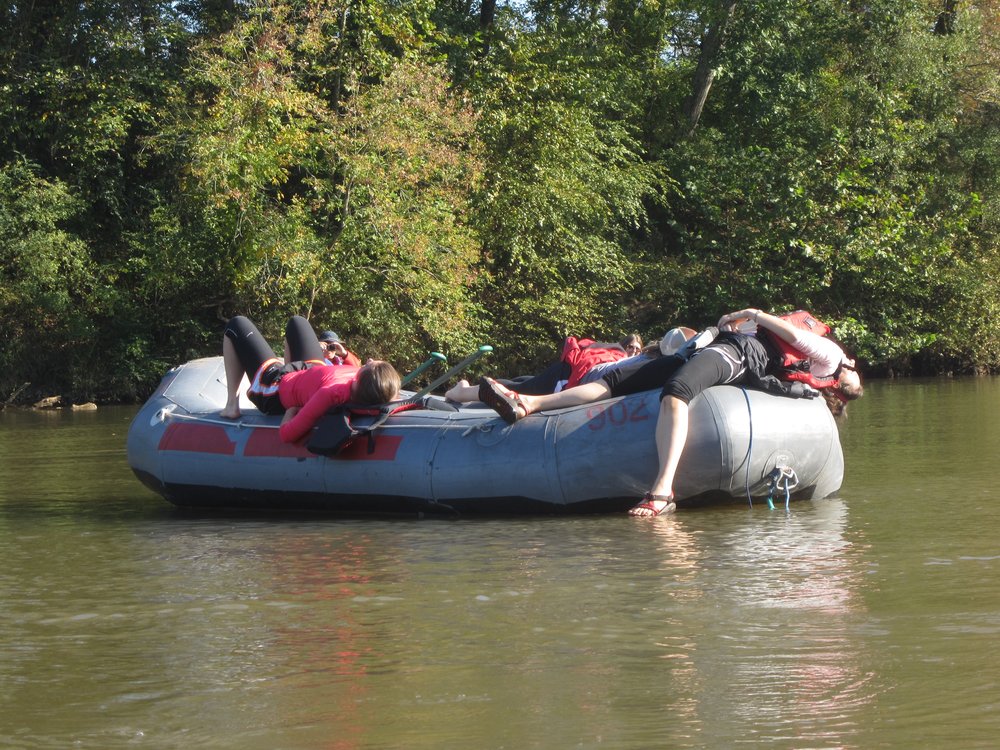
The next morning, the quiet Goat Island transformed as everyone was up and packing tents, stuffing sleeping bags, drinking coffee, marveling that the raft had been swept off in the night (my kayak was just held to shore). A dam upstream must have been released. John, Mike and I left early in our kayaks, and before we left, Allison sang a native song to the spider. The spider would help us find the raft (which we hoped was not hung up at the dam in Lockhart). She sang, then made an offering of coffee to the spiders. And her offering worked: a quarter mile downstream, the fat gray raft had lodged on the bank. John tied it off then we pushed downstream.
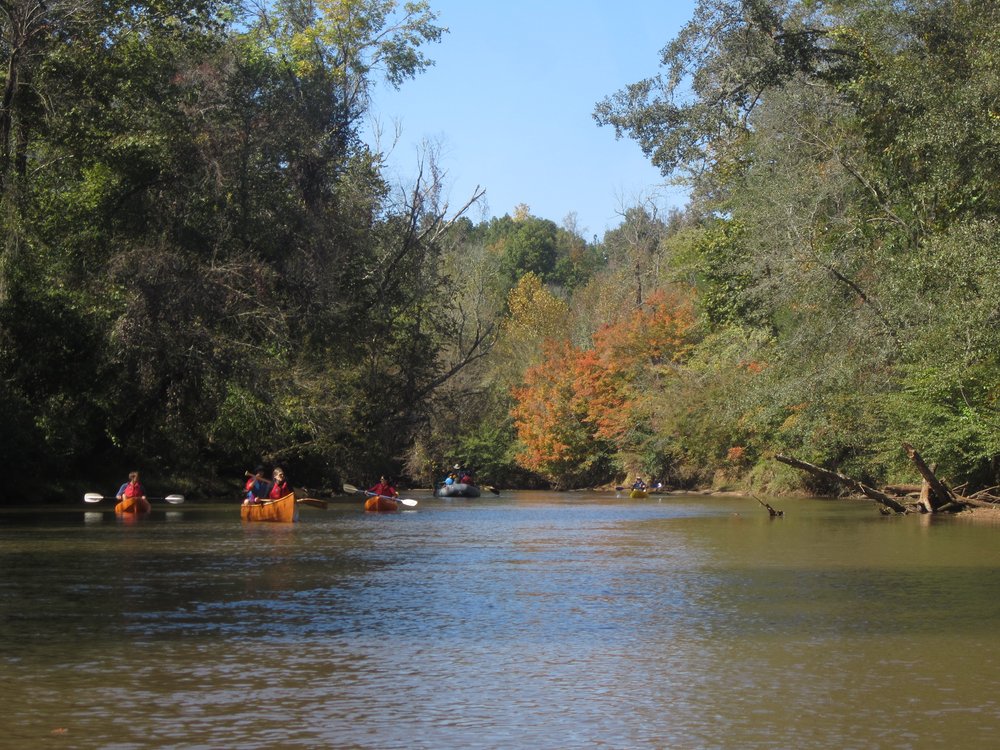
River Time
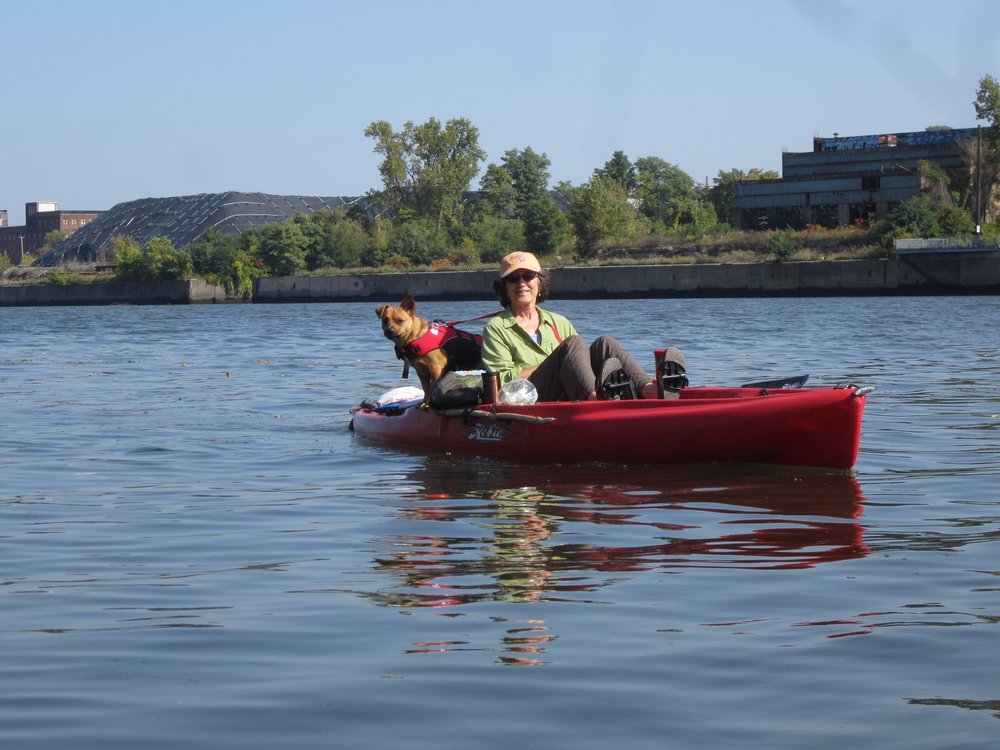
We included Merle, who at age 72 teaches Outward Bound courses, has a shock of curly gray-white hair and a calm steady demeanor; Kate on her pedal boat, after shoulder surgery, long legs shoving south; and me, on a short fall break from teaching, desperate not to think about faculty meetings. The most important team member, however, was Neena, a pint sized dog, which Kate had just rescued. This was Neena’s river baptism. To keep her happy--and who doesn't want to keep a dog happy--we stopped every hour to stretch and pee and marvel over how slowly we were moving.

We included Merle, who at age 72 teaches Outward Bound courses, has a shock of curly gray-white hair and a calm steady demeanor; Kate on her pedal boat, after shoulder surgery, long legs shoving south; and me, on a short fall break from teaching, desperate not to think about faculty meetings. The most important team member, however, was Neena, a pint sized dog, which Kate had just rescued. This was Neena’s river baptism. To keep her happy--and who doesn't want to keep a dog happy--we stopped every hour to stretch and pee and marvel over how slowly we were moving.
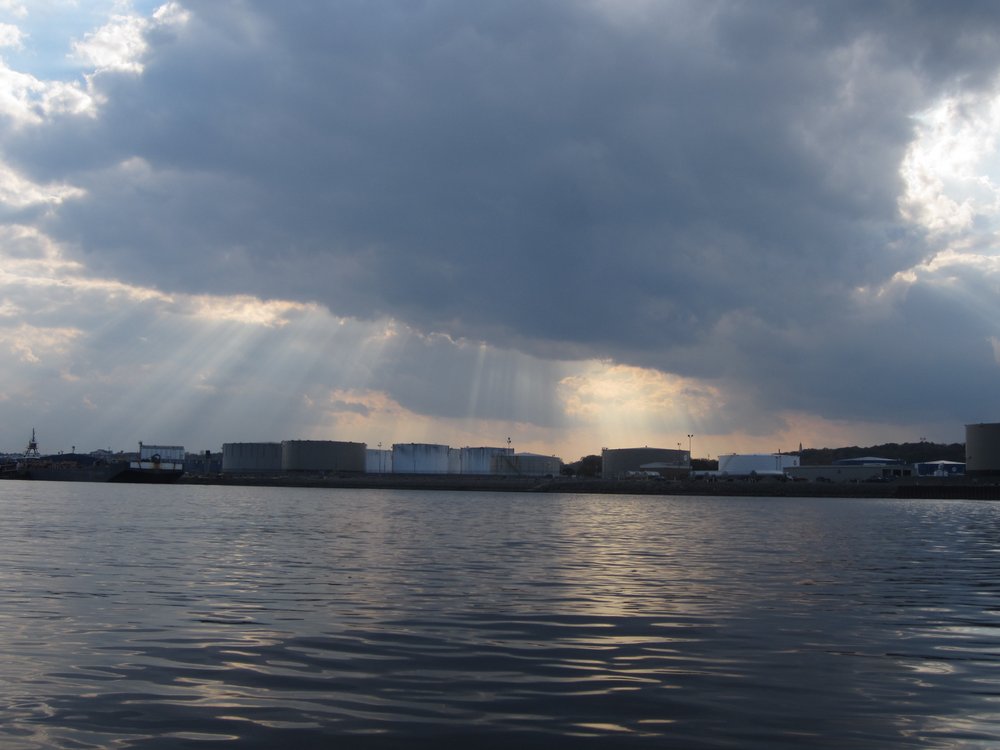
We needed a campsite in this unlovely place. Room for three tents, three boats, three tired women. Papscanee Island is not quite an island, and is rimmed with wooden pylons, visible at low tide, and beyond the pylons, rocks covered over with...asphalt. The asphalt was often cracked in a yawn to reveal a jumble of rock teeth. The Hudson River Watertrail guide states "There is no river access for boaters." But, we needed access into the trees. And that is what we found, directly across the narrow river from a set of oil tanks.
Once dark settled in, once we had eaten our magnificent burritos--all river food is delicious--we realized that the spot lights from the oil tanks were going to keep us company through the night. I had been yearning for the quiet that is sleeping with my back to the ground. But that is not what we had that night. At two in the morning a barge arrived, pushed by a roaring little tug. And they began to offload oil, using enormous diesel powered pumps. They were still pumping when we pulled our near sleepless bodies from our tents.
"That wins for the worst campsite of my life," I joked.
You would think at this point I would speak of grumpiness, of bad temper, or perhaps even the nuttiness of this adventure. Instead, I'm going to write of giddiness as we shoved south, of wonder as I counted the bald eagles that soared over us, or perched in a nearby tree, fishing for their next meal. By the end of the day I had counted twenty-two of the big birds, birds that but twenty years ago had all but vanished from the Hudson Valley. I allowed myself a drop of hope.
First the wind gusted from the south, making our passage a trial, then it shifted to the north, making it a joy. We scooted along, and by four in the afternoon, we pulled onto the sandy shore of Gays Point.
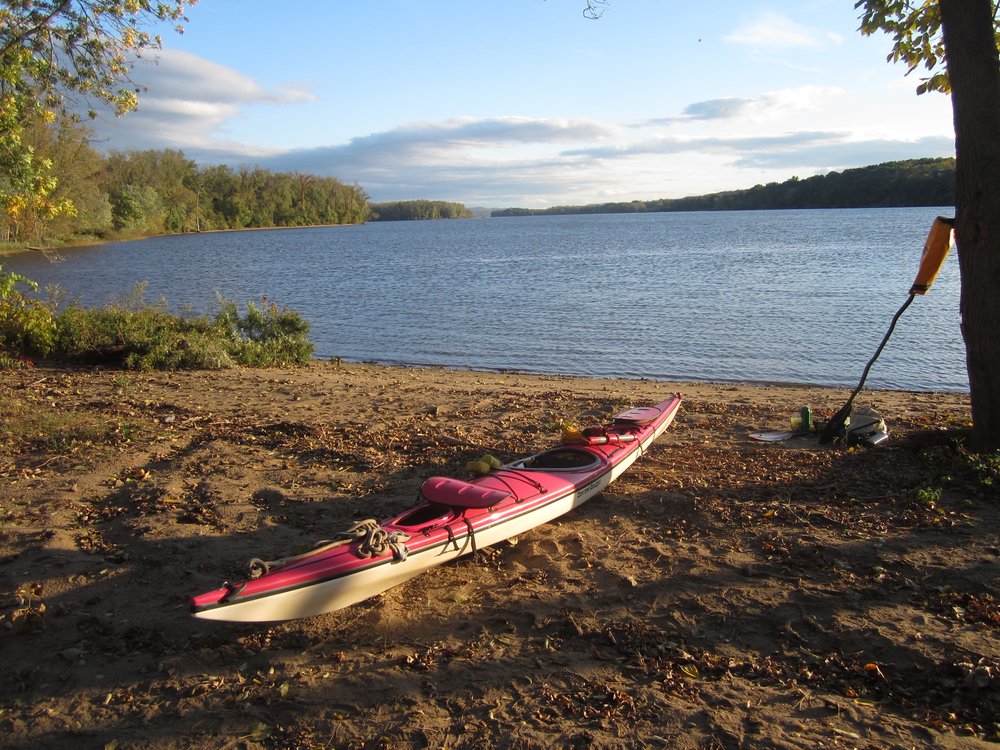
The smooth river pulled me early from my tent, to oatmeal and coffee. Before we slipped into our boats, we stood with our toes in the water and "clapped on" the river. Merle spoke of the beauty and necessity of this river, our time on it. It was but a drop of time, but at that moment I felt like we had been there for days, weeks, my body settled into its aches, my mind into the quiet thoughts that emerged from what I saw. Nothing more.
Then we pushed south, wondering where our adventure would end. As I approached Stockport Middle Grounds, the first flock of Brant coursed by over head. Six more flocks of the small dark geese flapped by, bringing news of the Arctic, and of colder weather, of winter.
I was now in familiar land, reaches I had paddled many times before: Middle Ground Flats, the quirky village of Athens, the Rip Van Winkle bridge. I knew the zig zag path of the channel in this section and how the eastern shore is shallow at low tide.
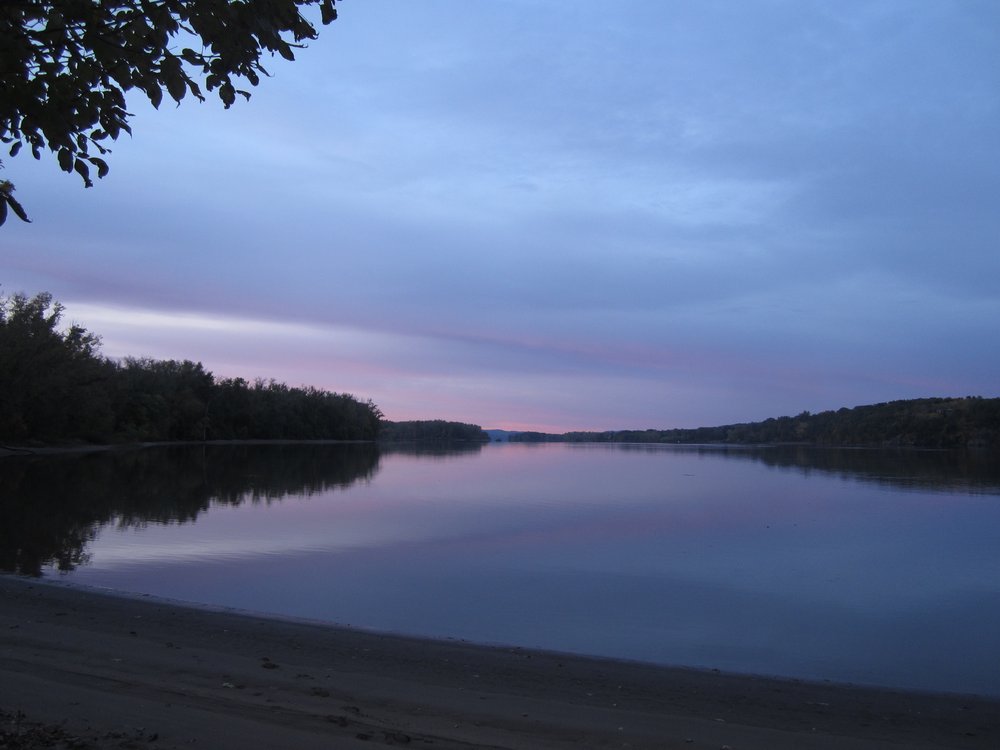
Merle, Kate and I stood with our toes in the water and "clapped off." Merle spoke with a clear wisdom, thanking the river for our time, the company, the adventures had and to come. I had tears in my eyes as we all clapped our goodbye to the river.
Squirrel Madness
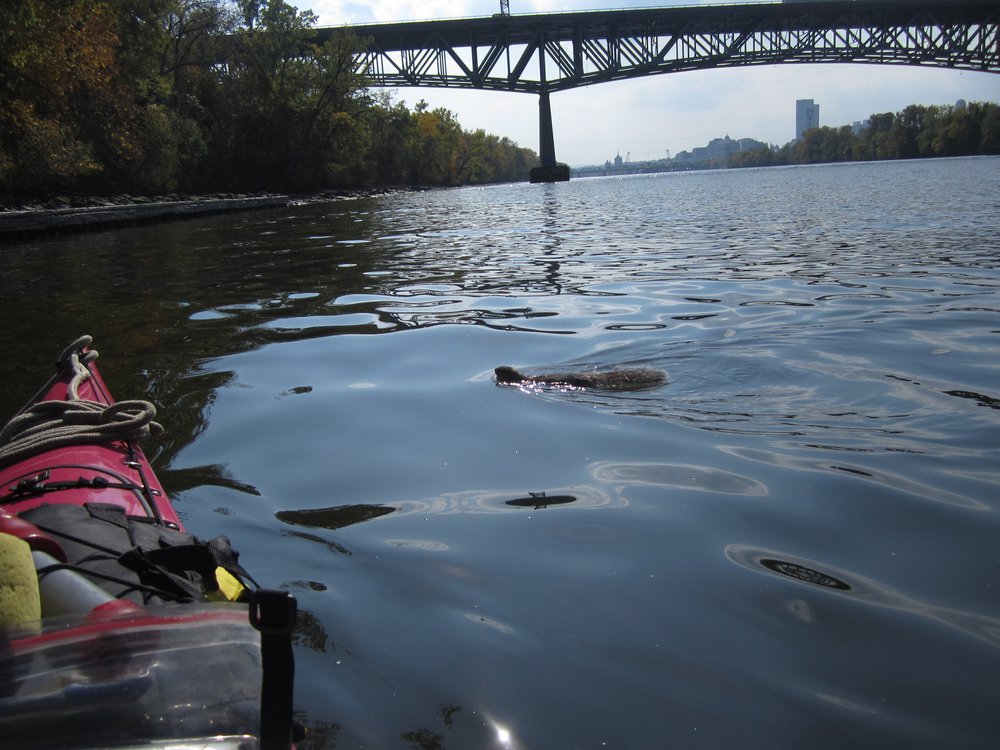
But there, near the bow of my boat, I spied something moving in the water. I usually see beaver or musk rat, sometimes I see snapping turtles, the V of their heads cutting the surface in the Tivoli Bay. This was not any of those familiar creatures. The animal had a fluffy gray tail that floated on the surface of the water, then a tiny head that was barely cutting the surface. A squirrel!

But there, near the bow of my boat, I spied something moving in the water. I usually see beaver or musk rat, sometimes I see snapping turtles, the V of their heads cutting the surface in the Tivoli Bay. This was not any of those familiar creatures. The animal had a fluffy gray tail that floated on the surface of the water, then a tiny head that was barely cutting the surface. A squirrel!

But here was a squirrel swimming the river, an athletic feat I had only seen once before. I steered toward the squirrel, then dropped my paddle and reached for my camera. As I started to point and shoot, I realized we were on a collision course. I tried to back stroke, but heard a small thunk. My heart sunk: I had just run over a squirrel, with my kayak. Then I saw the tiny paws reach up, grab one of the deck lines, and do a small pull up. Suddenly the soaked squirrel was perched on my sponge. We looked at each other. I apologized. I promised the squirrel I would take it to shore. The squirrel walked daintily to the end of my boat, and waited for safe passage. I slid onto shore and it sat there for a moment. Then it made the leap, and walked off to the woods.


